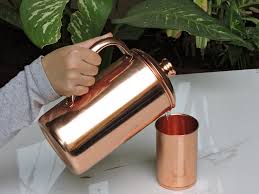If you’ve ever stumbled upon some holistic wellness blogs or Ayurveda articles, it’s highly likely that you’ve heard about the practice of drinking copper water. Yes, copper, the reddish metallic element that we often use for electrical wiring or kitchenware. While it may seem a bit unfathomable to drink from a copper vessel, proponents of this practice swear by its numerous health benefits, including improved digestion, enhanced immunity, and even anti-aging effects. However, as with all wellness trends, there are also potential downsides and risks associated with drinking copper water. In this blog post, we’ll dive into the pros and cons of drinking copper water, and what you should consider before incorporating it into your daily routine.
I.Explanation of copper water
Copper water has gained popularity in recent years due to its potential health benefits. The idea behind it is that water stored in a copper vessel can become infused with copper ions, which are known to have antimicrobial, antioxidant, and anti-inflammatory properties. These properties can help boost the immune system, improve digestion, reduce inflammation, promote weight loss, and regulate blood pressure. Copper water is also believed to stabilize the three doshas in our body, according to Ayurveda. However, it’s important to note that drinking copper water may have some downsides. Individuals with copper allergies may experience negative effects, and overconsumption can lead to copper toxicity. It can also cause gastrointestinal issues and promote bacterial growth in the water. Additionally, drinking copper water can be costly and inconvenient. Overall, it’s important to weigh the pros and cons before incorporating copper water into your daily routine.
Purpose of discussing pros and cons
The purpose of discussing the pros and cons of drinking copper water is to provide a comprehensive analysis of the topic. By examining the advantages and disadvantages, we can make an informed decision about whether or not it is a good choice for our health. It is important to approach this discussion with factual data and scientific evidence to support our claims.
Understanding the potential benefits of drinking copper water, such as boosting the immune system, improving digestion, reducing inflammation, promoting weight loss, and regulating blood pressure, allows us to appreciate the positive effects it may have on our overall well-being.
On the other hand, we must also consider the potential negative effects of drinking copper water, such as allergies, copper toxicity, gastrointestinal issues, and bacterial growth in the water. Additionally, the cost and inconvenience of using a copper water bottle should be taken into account.
By summarizing the pros and cons, providing a personal recommendation, and offering final thoughts, we can help readers make an educated decision about whether or not drinking copper water is a good choice for them.
II. The Pros of Drinking Copper Water
A. Helps boost the immune system
One of the key benefits of drinking copper water is its ability to boost the immune system. Copper has natural antioxidant properties that help decrease free radicals in the body, which can be harmful to the immune system. By fighting off these free radicals, copper water helps strengthen the immune system and protect against various diseases.
Furthermore, copper water is known to stimulate the production of new cells, which is crucial for maintaining a healthy immune system. It aids in the production of white blood cells, which are responsible for fighting off infections and keeping the body healthy.
In addition, copper water has been found to have anti-inflammatory properties, which can further support the immune system. Inflammation is a common response to infections and injuries, and reducing it can help the body heal faster and prevent further damage.
Drinking copper water is a natural and effective way to boost the immune system and enhance overall health. It is a simple addition to your daily routine that can have significant long-term benefits. So, why not give it a try and see the positive impact it can have on your immune system?
B. Improves digestion
Improving digestion is one of the major benefits of drinking copper water. Copper has properties that can kill harmful bacteria in the stomach and reduce inflammation, making it a great remedy for digestive issues such as ulcers, indigestion, and infections. It also aids in cleansing and detoxing the stomach, which helps regulate the functioning of the kidneys and liver. By promoting a healthy digestive system, drinking copper water can enhance the body’s ability to absorb nutrients and eliminate waste more efficiently.
Furthermore, copper water can aid in weight loss by helping the body break down fat and eliminate it more efficiently. It also has anti-inflammatory properties that can relieve arthritis and inflamed joints, providing relief from aches and pains. Additionally, copper plays a role in the production of melanin, a pigment that determines the color of the skin, hair, and eyes. Drinking water from a copper bottle can help replenish the top layers of the skin, resulting in smoother and more radiant skin.
In conclusion, improving digestion is just one of the many benefits of drinking copper water. With its ability to kill harmful bacteria, reduce inflammation, aid in weight loss, relieve arthritis, and enhance skin health, drinking water from a copper bottle is a natural and effective way to promote overall well-being.
C. Reduces inflammation
Copper water is touted as a natural way to reduce inflammation, and there is some factual data to support this claim. Studies have shown that copper has anti-inflammatory properties that can help alleviate various inflammatory conditions in the body. When water is stored in a copper vessel for at least four hours, copper leaches into the liquid, giving it certain qualities that can aid in reducing inflammation.
The anti-inflammatory effect of copper water is particularly beneficial for those who suffer from conditions like arthritis, ulcers, and indigestion. By combating inflammation-causing bacteria in the gut, copper water promotes a healthy digestive system and can provide relief from related issues.
However, it is important to note that excessive exposure to copper can lead to gastrointestinal problems and other complications. Therefore, it is crucial to drink copper water in moderation and follow the recommended guidelines.
Overall, while copper water may have positive effects in reducing inflammation, it is essential to consult with a healthcare professional before making it a regular part of your routine.
D. Promotes weight loss
Promoting weight loss is a common goal for many individuals, and drinking copper water is often touted as a natural way to aid in this process. Copper has properties that help the body break down fat and eliminate it efficiently. By drinking water stored in a copper bottle, you can potentially boost your weight loss efforts.
One of the reasons copper is believed to promote weight loss is its involvement in energy production. Copper plays a key role in breaking down fat and converting it into usable energy. This can help support your body’s natural metabolism and aid in shedding those extra pounds.
Additionally, copper water may help regulate digestion, which is essential for maintaining a healthy weight. It can improve digestive function and help alleviate issues such as bloating and indigestion, ensuring that your body effectively absorbs nutrients from the food you consume.
While copper water may offer potential benefits for weight loss, it’s important to remember that it is not a magical solution. It should be consumed as part of a well-balanced diet and regular exercise routine. Incorporating copper water into your healthy lifestyle may provide an extra boost to your weight loss journey.
E. Regulates blood pressure
One of the benefits of drinking copper water is its ability to regulate blood pressure. Copper has been found to help dilate blood vessels, improving blood flow to the heart and helping to regulate blood pressure levels. This is important for maintaining cardiovascular health and reducing the risk of heart disease. According to the American Cancer Society, copper has also been shown to lower cholesterol levels and heart rate, further contributing to a healthy cardiovascular system.
By drinking water from a copper vessel, you can naturally incorporate this essential trace mineral into your diet and promote better blood pressure regulation. It’s important to note that copper water should be consumed in moderation, as excessive amounts can lead to copper toxicity. The World Health Organization recommends a maximum intake of 10mg of copper per day. With proper usage, drinking copper water can be a natural and beneficial way to support heart health and maintain optimal blood pressure levels.
III. The Cons of Drinking Copper Water
A. Can have negative effects on individuals with copper allergies
Individuals with copper allergies may experience negative effects when consuming copper water. Allergies to copper are rare, but they can cause symptoms such as skin rashes, itching, and swelling. Some individuals may also experience gastrointestinal issues like nausea, vomiting, and diarrhea. It is important for individuals with known copper allergies to avoid consuming copper water or using copper-based cookware and utensils. If an allergic reaction occurs after consuming copper water, it is recommended to seek medical attention to manage the symptoms. It’s also important to note that individuals with Wilson’s disease should avoid consuming copper water as it can worsen their condition. Therefore, before incorporating copper water into your daily routine, it is essential to consider any known allergies or medical conditions and consult with a healthcare professional.
B. Overconsumption can lead to copper toxicity
Overconsumption of copper water can lead to copper toxicity, which can have negative effects on our health. It is important to remember that copper is a trace mineral that our body needs in small quantities. When we exceed the daily limit of copper required in our body, it becomes toxic and can lead to various health issues. Just like with any other vitamin or mineral, excessive intake can be harmful.
Copper toxicity can affect our liver function, make us susceptible to various health problems, and, in extreme cases, even cause death. It is important to be mindful of the amount of copper water we consume and not to overdo it. Maintaining a balanced intake is crucial to avoid the negative effects of copper toxicity.
If you are considering drinking copper water, it is recommended to consult with a healthcare professional to determine the appropriate amount for your individual needs. They can help you understand the benefits and risks associated with drinking copper water and guide you on the right way to go about it. Remember, moderation is key when it comes to consuming any substance, including copper water.
C. Can cause gastrointestinal issues
Drinking copper water can potentially cause gastrointestinal issues for some individuals. This is because copper has a natural tendency to react with acidic substances, which can lead to the release of copper salts. When these salts are ingested, they can cause copper toxicity and result in various health problems. Symptoms of copper toxicity include a metallic taste in the mouth, nausea, vomiting, and even internal bleeding. It is important to note that the risk of developing gastrointestinal issues from drinking copper water depends on factors such as the quality of the vessel and the duration of contact between the water and the copper. To minimize the chances of experiencing these negative effects, it is advisable to only store drinking water in high-quality, food-grade copper vessels that have not been lined on the inside. Additionally, it is crucial to avoid storing acidic substances such as citrus juices or pickled foods in copper vessels, as these can significantly increase the risk of copper toxicity.
D. Can promote bacterial growth in the water
One potential downside of drinking copper water is that it can promote bacterial growth in the water. Copper has natural antibacterial properties that can kill harmful bacteria, but it can also create an environment that allows for the growth of certain types of bacteria. This is especially true if the copper vessel is not properly cleaned and maintained. When water is stored in a copper vessel for a long period of time, the copper leaches into the water, and if any bacteria are present, they can thrive in this environment. To prevent bacterial growth, it’s important to regularly clean the copper vessel and avoid leaving water in it for extended periods of time. It’s also important to note that copper water should not be consumed if it has a metallic taste or if there are any signs of mold or bacterial growth. Overall, while copper water can have its benefits, it’s important to be aware of the potential for bacterial growth and take proper precautions to ensure safety.
E. Can be costly and inconvenient
Drinking copper water may come with some drawbacks in terms of cost and convenience. Firstly, copper water bottles can be more expensive compared to other types of water bottles. The cost of copper material and the intricate design of these bottles can add to their price tag. Additionally, finding copper water bottles may not be as readily available as other options, making them less convenient to purchase.
In terms of maintenance, copper water bottles require regular cleaning to prevent the buildup of copper oxide, which can affect water taste and quality. This can be seen as an inconvenience compared to other types of water bottles that may be easier to clean.
Furthermore, copper water bottles may not be suitable for everyone’s lifestyle and budget. Some individuals may find the cost and upkeep of copper water bottles to be excessive, especially if they are looking for a more affordable or low-maintenance option. It’s important to weigh the pros and cons of drinking copper water and consider whether the cost and inconvenience are worth the potential health benefits.
IV. Conclusion
A. Summary of pros and cons
In summary, drinking copper water can have several potential benefits for our health, including boosting the immune system, improving digestion, reducing inflammation, promoting weight loss, and regulating blood pressure. Copper is known to have antimicrobial properties that can kill viruses, yeast, and bacteria, which helps reduce the risk of cancer and heart disease. It can also assist in the absorption of iron and slow down the effects of aging.
However, it is important to consider the potential negative effects as well. Drinking copper-infused water can cause side effects such as diarrhea, vomiting, and nausea if consumed in high concentrations. Overconsumption of copper can lead to copper toxicity, causing liver and kidney failure. It can also cause gastrointestinal issues and promote bacterial growth in the water. Additionally, drinking water from copper utensils can have a bad metallic taste, and it can be costly and inconvenient.
In conclusion, while there are potential benefits to drinking copper water, it is crucial to exercise caution and moderation. It is recommended to follow the prescribed daily dose of copper consumption and choose a safe and quality copper water bottle to minimize any potential risks. Ultimately, the decision to drink copper water should be based on personal preferences and individual health considerations.
B. Personal recommendation regarding drinking copper water
After thoroughly examining the pros and cons of drinking copper water, it is important to provide a personal recommendation. While copper water does have potential health benefits such as boosting the immune system, improving digestion, reducing inflammation, promoting weight loss, and regulating blood pressure, there are also negative effects to consider. Individuals with copper allergies, overconsumption leading to copper toxicity, gastrointestinal issues, bacterial growth in the water, and the cost and inconvenience of using copper water bottles are all valid concerns.
Based on the available factual data, it is recommended to approach drinking copper water with caution. It is crucial to follow the recommended daily dose of copper and use high-quality copper water bottles that are lined with materials such as nickel or stainless steel to prevent copper leaching. Additionally, it is advisable to consult with a healthcare professional or nutritionist before incorporating copper water into your daily routine.
In conclusion, while copper water may offer potential health benefits, it is important to weigh the pros and cons and make an informed decision based on personal health needs and preferences.
C. Final thoughts on whether or not it’s a good choice.
Drinking copper water from a copper bottle can have both pros and cons. On the positive side, copper water can help boost the immune system, improve digestion, reduce inflammation, promote weight loss, and regulate blood pressure. Copper water bottles have been found to have antibacterial properties and can aid in healing wounds. However, there are also negative aspects to consider. Copper water can have negative effects on those with copper allergies, overconsumption can lead to copper toxicity, it can cause gastrointestinal issues, promote bacterial growth in the water, and be costly and inconvenient.
Overall, while copper water bottles may offer certain health benefits, it is important to use them responsibly and consider individual needs and sensitivities. Consulting with a healthcare professional is advisable, particularly if there are concerns about copper allergies or toxicity. It is also important to weigh the potential benefits against the potential drawbacks and make a personal decision based on individual preferences and circumstances.




